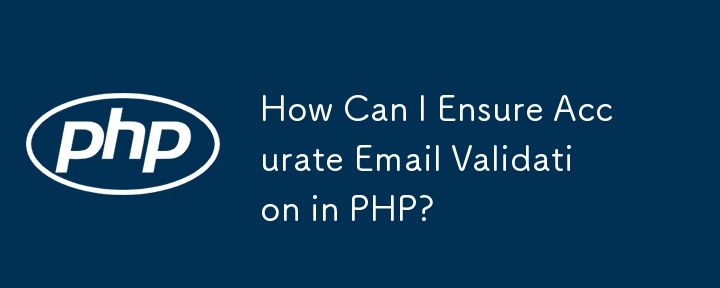

PHP Email Validation: A Comprehensive Examination
Email validation is a crucial aspect of web development, ensuring that email addresses provided by users are valid. This task can seem deceptively simple, but the reality is quite complex.
Assessing Your Current Function
The provided function relies on a regular expression to validate email addresses. While this approach may appear straightforward, it's important to recognize its limitations:
The Preferred Approach Using filter_var()
For a more robust and reliable email validation process, we recommend utilizing the filter_var() function:
if (!filter_var($email, FILTER_VALIDATE_EMAIL)) {
// invalid emailaddress
}This function leverages a continuously updated regex pattern maintained by PHP developers to validate email addresses against the current RFC specifications.
Additional Considerations
Beyond basic validation, you may also want to check if the specified email domain has a valid MX record, indicating its ability to receive emails:
if (!checkdnsrr($domain, 'MX')) {
// domain is not valid
}However, it's crucial to emphasize that even these checks cannot guarantee the existence of a mailbox associated with the provided email address.
The Illusion and Complexity of Regex Validation
Despite its popularity, email address validation using solely regex is an inherently imperfect endeavor. The email address syntax is notoriously complex, making it virtually impossible to devise a regex that simultaneously captures all valid addresses and excludes all invalid ones.
PHP's Email Validation Regex and Its Evolution
For those curious, PHP's filter_var() function leverages a continuously updated regex pattern defined within its source code. You can explore its intricacies by referring to the PHP source.
Resources for Further Learning
If you seek a deeper understanding of email addresses and their validation, we encourage you to delve into the RFCs listed below:
The above is the detailed content of How Can I Ensure Accurate Email Validation in PHP?. For more information, please follow other related articles on the PHP Chinese website!
 pr shortcut key
pr shortcut key
 The difference between python courses and c+ courses
The difference between python courses and c+ courses
 Common website vulnerability detection methods
Common website vulnerability detection methods
 What are the gsm encryption algorithms?
What are the gsm encryption algorithms?
 What to do if your IP address is attacked
What to do if your IP address is attacked
 The difference between insertbefore and before
The difference between insertbefore and before
 What protocols does the ssl protocol include?
What protocols does the ssl protocol include?
 How to open xml file
How to open xml file




